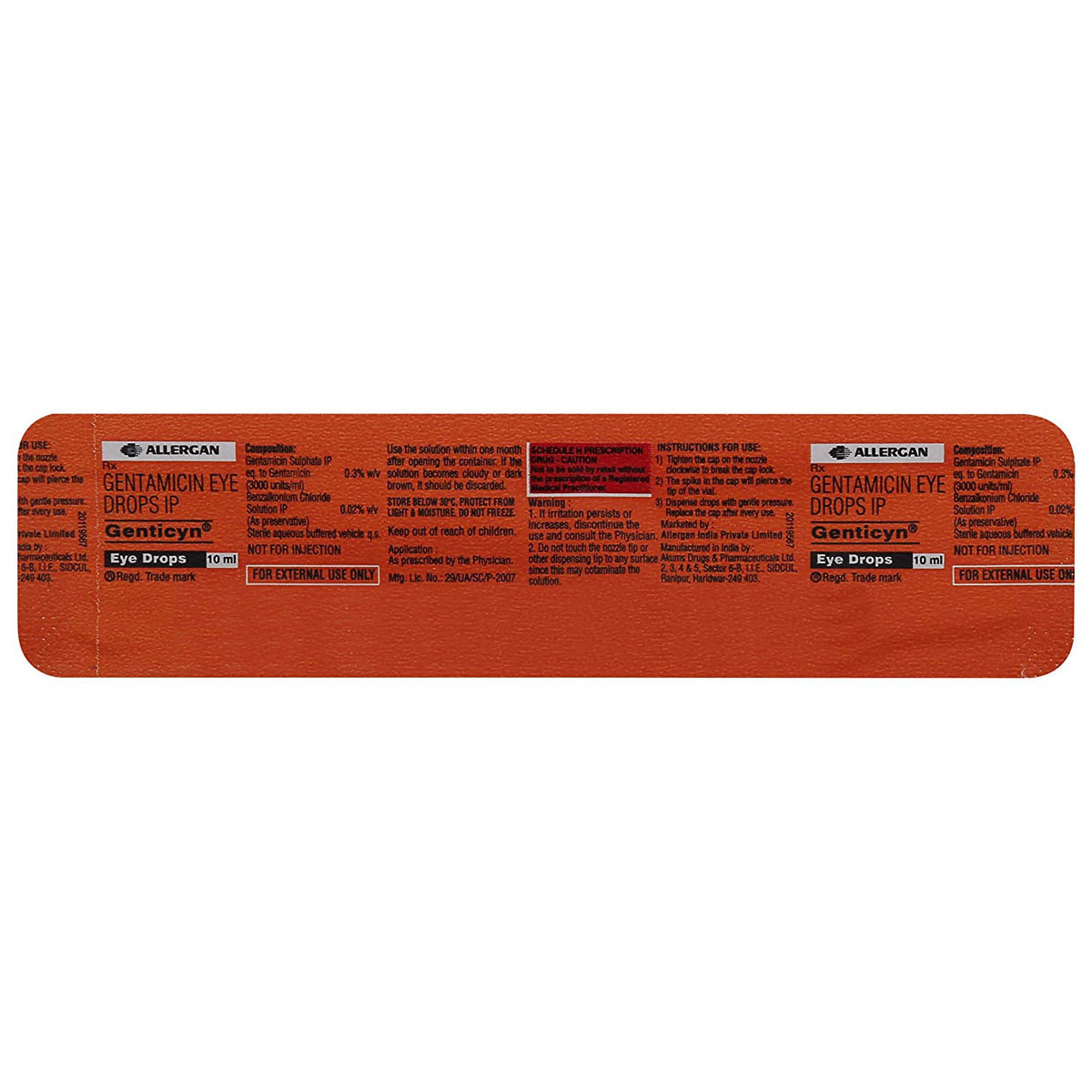Gentarid Eye/Ear Drops 10 ml
MRP ₹36
(Inclusive of all Taxes)
₹5.4 Cashback (15%)
Provide Delivery Location
Online payment accepted
 Prescription drug
Prescription drugWhats That
Composition :
Manufacturer/Marketer :
Consume Type :
Expires on or after :
Return Policy :
About Gentarid Eye/Ear Drops
Gentarid Eye/Ear Drops is an antibiotic medicine that treats bacterial infections of the eye and ear. It is used to treat infections like conjunctivitis (inflammation of the mucous membrane (conjunctiva) of the eye), keratitis (inflammation of the cornea), keratoconjunctivitis (inflammation of conjunctiva and cornea), blepharitis (inflammation of the eyelids), blepharoconjunctivitis (inflammation of conjunctiva and eyelids), corneal ulcers, and otitis externa (inflammation of the ear).
Gentarid Eye/Ear Drops is composed of Gentamicin, an aminoglycoside antibiotic. It prevents bacteria from synthesising essential proteins required to carry out vital functions. It has broad-spectrum activity against aerobic Gram-positive and Gram-negative bacteria.
Gentarid Eye/Ear Drops is for external use only. Common side effects of Gentarid Eye/Ear Drops, when used as eye drops, include local sensitivity in the eye, irritation, itching, redness, burning or a stinging sensation at the application site, and blurred vision. Side effects of Gentarid Eye/Ear Drops, when used as ear drops, include local sensitivity in the ear, burning or stinging sensation, itching, skin inflammation, and vestibular disorder/dizziness. These side effects may not occur in every patient using this medication and differ individually. If the side effects persist longer or worsen, please seek a doctor's advice.
Let your doctor know if you are allergic to Gentarid Eye/Ear Drops or any other medications. Please inform your doctor if you have any liver/kidney diseases, myasthenia gravis (muscle weakness), hearing problems, and a perforated eardrum before using Gentarid Eye/Ear Drops. Pregnant and breastfeeding mothers should consult the doctor before starting Gentarid Eye/Ear Drops. This medicine may cause temporary blurred vision; hence drive only when you are alert and have clear vision. Avoid or limit alcohol consumption during the treatment since Gentarid Eye/Ear Drops may cause dizziness. Gentarid Eye/Ear Drops should be used for children only when advised by a doctor.
Uses of Gentarid Eye/Ear Drops
Directions for Use
Key Benefits
Gentarid Eye/Ear Drops treats various bacterial infections of the eye and ear. Gentarid Eye/Ear Drops consists of Gentamicin, an antibiotic that prevents the synthesis of essential proteins required by bacteria to carry out vital functions. Gentarid Eye/Ear Drops may also be given as a treatment to prevent infections in the injured eye or ear.
Storage
Drug Warnings
Inform your doctor if you have any allergic reactions to Gentamicin before starting Gentarid Eye/Ear Drops. Avoid touching the dropper with bare hands or taking it closer to the eyelids/ear while administering since it contaminates the dropper tip and solution. If you wear contact lenses, remove them while administering the medicine into the eye. It is advised to check with your doctor before using Gentarid Eye/Ear Drops if you are pregnant or breastfeeding. Avoid driving or operating machines since the administration of Gentarid Eye/Ear Drops may cause temporary blurred vision for a while. Avoid or limit alcohol consumption during the treatment since Gentarid Eye/Ear Drops may cause dizziness. Gentarid Eye/Ear Drops should be used for children only when advised by a doctor.
Drug-Drug Interactions
Drug-Drug Interactions
Login/Sign Up
Taking Gentarid Eye/Ear Drops 10 ml with cidofovir can increase the risk of kidney problems.
How to manage the interaction:
Although taking Gentarid Eye/Ear Drops 10 ml and cidofovir together can possibly cause an interaction, it can be taken if your doctor has suggested it. However, if you experience nausea, vomiting, loss of appetite, increased or decreased urination, sudden weight gain or loss, fluid retention, swelling, shortness of breath, muscle cramps, tiredness, weakness, dizziness, confusion, or an irregular heart rhythm, consult a doctor. Do not discontinue any medications without consulting a doctor.
Co-administration of of clindamycin with Gentarid Eye/Ear Drops 10 ml may increase the risk of kidney and/or nerve damage.
How to manage the interaction:
Although there is a possible interaction, clindamycin can be taken with Gentarid Eye/Ear Drops 10 ml if prescribed by the doctor. Consult the prescriber if you experience signs and symptoms of kidney damage such as sudden weight gain or weight loss, nausea, vomiting, fluid retention, loss of appetite, increased or decreased urination, swelling, shortness of breath, muscle cramps, tiredness, weakness, dizziness, confusion, and irregular heart rhythm. If you develop diarrhea or vomiting during treatment with these medications, drink plenty of fluids to prevent dehydration, as dehydration may also harm the kidney.
Using Gentarid Eye/Ear Drops 10 ml with Botulinum toxin can increase the risk of side effects.
How to manage the interaction:
Although there is an interaction between Botulinum toxin and Gentarid Eye/Ear Drops 10 ml, they can be taken together if prescribed by a doctor. However, contact a doctor immediately if you experience muscle weakness or trouble breathing, swallowing, or speaking. Do not discontinue any medications without consulting a doctor.
Co-administration of Colistin with Gentarid Eye/Ear Drops 10 ml can increase the levels and risk of Colistin side effects.
How to manage the interaction:
Although there is a possible interaction between Colistin and Gentarid Eye/Ear Drops 10 ml, you can take these medicines together if prescribed by your doctor. However, if you experience weight gain or loss suddenly, muscle pain, dizziness, or palpitations, call your doctor right away. Do not stop using any medications without a doctor's advice.
Co-administration of Gentarid Eye/Ear Drops 10 ml and Tubocurarine may increase the risk of side effects.
How to manage the interaction:
Co-administration of Gentarid Eye/Ear Drops 10 ml with Tubocurarine can possibly result in an interaction, but it can be taken if a doctor has advised it. If you have any of these symptoms, it's important to contact a doctor right away. These symptoms include having trouble breathing, feeling very weak or unable to breathe, not being able to move your muscles, having problems with your kidneys, having low levels of calcium in your body, or feeling very sick. Do not discontinue any medications without consulting a doctor.
Co-administration of Gentarid Eye/Ear Drops 10 ml and Temsirolimus may increase the risk of kidney problems.
How to manage the interaction:
Co-administration of Gentarid Eye/Ear Drops 10 ml with Temsirolimus can possibly result in an interaction, but it can be taken if a doctor has advised it. It's important to keep an eye on how much you pee. If you notice any changes like peeing more or less than usual, it's a good idea to let your doctor know right away. Some signs to watch out for include gaining weight quickly, feeling bloated, having trouble breathing, or feeling sick to your stomach. Other symptoms to be aware of are not feeling hungry, losing weight, swelling, muscle cramps, feeling weak or dizzy, feeling confused, or having an irregular heartbeat. Do not stop using any medications without a doctor's advice.
Co-administration of Metrizamide with Gentarid Eye/Ear Drops 10 ml may increase the risk of kidney problems.
How to manage the interaction:
Taking Gentarid Eye/Ear Drops 10 ml with Metrizamide together can possibly result in an interaction, but it can be taken if your doctor has advised it. It's important to keep an eye on how much you pee. If you notice any changes, like peeing more or less than usual, it's a good idea to let a doctor know right away. Other symptoms to watch out for include feeling sick, throwing up, not wanting to eat, gaining or losing weight suddenly, or having trouble with your muscles, balance, or heart rhythm. Do not stop using any medications without a doctor's advice.
Coadministration of Sirolimus with Gentarid Eye/Ear Drops 10 ml may increase the risk or severity of kidney problems.
How to manage the interaction:
Although there is a possible interaction, Gentarid Eye/Ear Drops 10 ml can be taken with sirolimus if prescribed by the doctor. Consult the doctor if you experience symptoms of kidney damage such as nausea, vomiting, loss of appetite, increased or decreased urination, sudden weight gain or weight loss, swelling, shortness of breath, muscle cramps, tiredness, weakness, dizziness, confusion, and irregular heart rhythm. Do not stop using any medication without consulting your doctor.
Co-administration of Mivacurium with Gentarid Eye/Ear Drops 10 ml can make it more effective as a therapy.
How to manage the interaction:
Taking Gentarid Eye/Ear Drops 10 ml with Mivacurium chloride together can possibly result in an interaction, but it can be taken if a doctor has advised it. If you have trouble breathing or feel like you can't breathe at all, it's important to contact a doctor right away. This is especially true if you're having difficulty breathing for a long time. Do not stop using any medications without talking to a doctor.
Co-administration of Magnesium sulfate with Gentarid Eye/Ear Drops 10 ml can increase the risk of muscle weakness.
How to manage the interaction:
Although there is a possible interaction between Magnesium sulfate and Gentarid Eye/Ear Drops 10 ml, you can take these medicines together if prescribed by a doctor. However, consult a doctor if you experience muscle weakness and breathing difficulties. Do not stop using any medications without talking to a doctor.
Drug-Food Interactions
Drug-Food Interactions
Login/Sign Up
Diet & Lifestyle Advise
Ear infections:
- Manage stress, eat healthily, drink plenty of water, exercise regularly, and get plenty of sleep.
- Eat food rich in antioxidants such as berries, spinach, kidney beans, dark chocolate, etc.
- Know your allergy triggers, such as pollen, dust and other factors.
- Avoid getting things like shampoo, soap, and water into the ear as it can cause itching.
- Do not poke or scratch the ear as it can cause damage to the ear canal, leading to inflammation. The inflamed skin can be infected by bacteria or fungi, which can cause infections in the ear.
Eye infections:
- Do not rub your eyes even though some ophthalmic drugs make your eye itchy.
- If you wear contact lenses: Clean and replace contact lenses more often. Never share contact lenses. Always remember to wash your hands before inserting and after removing the contact lens.
- Avoid staring at the digital screens for longer durations. Rest your eyes every 20 minutes.
- Avoid or limit the intake of alcohol and caffeine.
Side Effects of Gentarid Eye/Ear Drops
Eye drops:
- Local sensitivity in the eye
- Irritation
- Itching
- Redness
- Burning or a stinging sensation
- Blurred vision
Ear drops:
- Local sensitivity in the ear
- Burning or stinging sensation
- Itching
- Skin inflammation
- Vestibular disorder/dizziness
Habit Forming
Therapeutic Class
All Substitutes & Brand Comparisons
RX
Out of StockGenticyn Eye/Ear Drops 10 ml
Allergan Healthcare India Pvt Ltd
₹9.89
(₹0.89/ 1ml)
72% CHEAPERRX
Out of StockZonticin Eye/Ear Drop
Zeelab Pharmacy Pvt Ltd
₹11
(₹0.99/ 1ml)
69% CHEAPERRX
Out of StockRegenta Eye/Ear Drops 10 ml
Regaine Laboratories
₹15
(₹1.35/ 1ml)
58% CHEAPER
Author Details
We provide you with authentic, trustworthy and relevant information
Drug-Diseases Interactions
Drug-Diseases Interactions
Login/Sign Up
Adequate hydration is critical for reducing the risk of oto- and nephrotoxicity associated with aminoglycoside usage. Dehydration should preferably be treated before starting therapy. Fluid status should be continuously maintained in patients who are at risk of dehydration, such as those who have severe and/or prolonged diarrhoea or vomiting. If indications of renal irritation appear during therapy, hydration should be increased as directed, followed by a dose reduction if necessary. If urine flow gradually decreases or azotemia worsens, therapy should be discontinued.
How to manage the interaction:
Dehydration should be corrected prior to initiation of therapy. Fluid status should be monitored closely in patients who may be at risk for dehydration, such as those with severe and/or prolonged diarrhea or vomiting. Therapy should be withdrawn if urinary output decreases progressively or azotemia (elevated levels of urea) increases.
Aminoglycosides can elicit dose-related neuromuscular blockade and muscle weakness, especially in patients with neuromuscular illness or hypocalcemia, as well as in those undergoing general anaesthesia, neuromuscular blocking medications, or substantial transfusions of citrate-anticoagulated blood. Although neuromuscular blockade caused by aminoglycosides is usually self-limiting, it can occasionally result in respiratory paralysis. The most potent neuromuscular blocking drug in the class is regarded to be neomycin. However, the risk is greatest with large dosages instilled intraperitoneally or intrapleurally, or with fast intravenous administration of parenteral aminoglycosides. In patients with neuromuscular problems (e.g., myasthenia gravis, parkinsonian syndrome, botulism) or hypocalcemia, aminoglycoside therapy should be used with caution. If indications of respiratory paralysis appear during aminoglycoside therapy, the medicine should be stopped and, if necessary, mechanical breathing assistance administered.
How to manage the interaction:
Therapy should be administered cautiously in patients with neuromuscular disorders (e.g., myasthenia gravis, Parkinsonian syndrome, botulism) or hypocalcemia (low calcium levels). The drug should be discontinued and mechanical respiratory assistance provided if needed if signs of respiratory paralysis occur during therapy.
Aminoglycosides can harm the eighth cranial nerve, causing vestibular and/or auditory toxicity. Dizziness, nystagmus, vertigo, ataxia, tinnitus, and varied degrees of hearing impairment are among the symptoms. Following the discontinuation of the medicine, permanent hearing loss, including whole or partial irreversible bilateral deafness, may occur. Therapy with aminoglycosides, especially if extended (> 10 days), should be used with caution in patients with preexisting vestibular and/or auditory impairment, as it may delay or obfuscate the diagnosis of a drug-induced ototoxic impact. Patients should be adequately hydrated, the usual aminoglycoside dosage should not be exceeded, use with other ototoxic agents should be avoided, and peak and trough serum aminoglycoside concentrations should be determined on a regular basis and dosage adjusted to maintain desired levels.
How to manage the interaction:
Therapy should be administered with caution in patients with ototoxicity. The dosage should be reduced or therapy shoule be withdrawn if signs and symptoms of toxicity develop.
Aminoglycosides have the potential to be ototoxic and nephrotoxic. Damage to the eighth cranial nerve can cause vestibular and/or auditory toxicities such as dizziness, nystagmus, vertigo, ataxia, tinnitus, and varied degrees of hearing impairment. Tubular necrosis, increases in BUN, nonprotein nitrogen, and serum creatinine concentration, decreases in urine specific gravity and creatinine clearance, proteinuria, and cells or casts in the urine are all signs of nephrotoxicity. Rarely, renal electrolyte wasting can cause hypocalcemia, hypomagnesemia, and hypokalemia, which can be accompanied with paresthesia, tetany, disorientation, and positive Chvostek and Trousseau symptoms. Although aminoglycoside-induced nephrotoxicity is often reversible after treatment withdrawal, mortality from uremia has happened on rare occasions. Patients with renal impairment should be treated with caution and at lower doses of aminoglycosides, as they may be at risk.Drug buildup increases the risk of oto- and nephrotoxicity. Patients should be adequately hydrated, the usual aminoglycoside dosage should not be exceeded, use with other neuro- and nephrotoxic agents should be avoided, and peak and trough serum aminoglycoside concentrations should be determined on a regular basis and dosage adjusted to maintain desired levels. If toxicity develops, renal and eighth cranial nerve function should be constantly monitored, and the dosage lowered or therapy discontinued.
How to manage the interaction:
Therapy should be administered cautiously at reduced dosages in patients with kidney impairment. Patients should be adequately hydrated, the dose should not be exceeded, and use with other neuro- and nephrotoxic agents should be avoided to minimize the risk of toxicity.
FAQs
Drug-Drug Interactions Checker List
- ETHACRYNIC ACID
- FUROSEMIDE
- AMPHOTERICIN B
- CICLOSPORIN
- CISPLATIN
Special Advise
It is advised to contact your doctor if the infection symptoms persist or worsen after two weeks of treatment.
Disease/Condition Glossary
Bacterial eye infection: A bacterial eye infection occurs when bacteria invade any part of the eyeball or its surrounding tissues, including the cornea (clear front surface of the eye) and the conjunctiva (thin membrane lining the outer eye and inner eyelids). A bacterial eye infection symptoms include red eyes, pain, swelling of the eyes, watery eyes, itching, and blurry vision. Some very common eye infections are conjunctivitis, stye (bump on the eyelid), uveitis (inflammation of the uvea-middle layer of the eye), marginal keratitis (inflammation of the cornea), and blepharitis.
Bacterial ear infection: Bacterial ear infection occurs when bacteria infect the outer or middle ear. The most common bacterial strains that cause ear infections are Streptococcus pneumoniae and Haemophilus influenza. Symptoms include ear ache (sharp, sudden pain or a dull, continuous pain), feeling of fullness in the ear, ear drainage, and muffled hearing. Treatment may include over-the-counter painkillers, anti-allergic drugs, antibiotics, and steroids.

Have a query?
Alcohol
Safe if prescribed
Alcohol consumption may worsen the side effects like dizziness; hence please avoid or limit alcohol intake while being treated with Gentarid Eye/Ear Drops.
Pregnancy
Consult your doctor
It is advised to consult your doctor if you plan to conceive or are already pregnant before starting Gentarid Eye/Ear Drops.
Breast Feeding
Consult your doctor
There are limited studies on how Gentarid Eye/Ear Drops affects breastfed infants. Please consult your doctor before using Gentarid Eye/Ear Drops if you are breastfeeding.
Driving
Safe if prescribed
Gentarid Eye/Ear Drops may cause side effects like blurry vision or dizziness, affecting your driving ability. Do not drive or operate machinery in such cases. Drive only when you are alert and have clear vision.
Liver
Consult your doctor
Let your doctor know if you have any history of liver diseases or hepatic impairment before starting Gentarid Eye/Ear Drops.
Kidney
Consult your doctor
Let your doctor know if you have any history of kidney diseases before starting Gentarid Eye/Ear Drops.
Children
Safe if prescribed
Gentarid Eye/Ear Drops should be used for children only when advised by a doctor.









